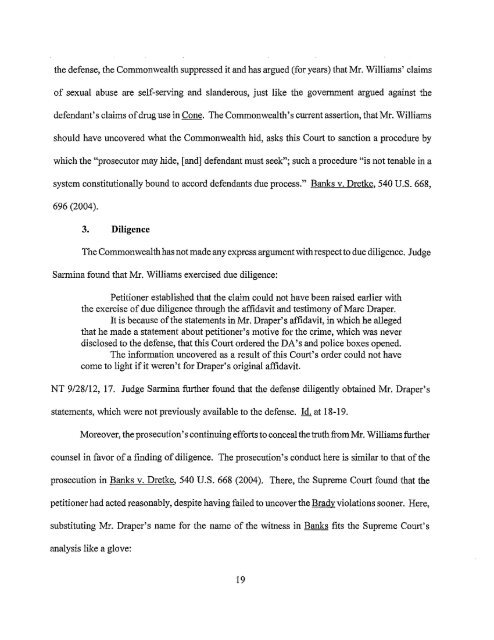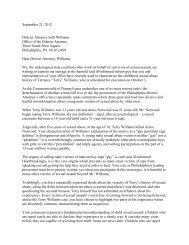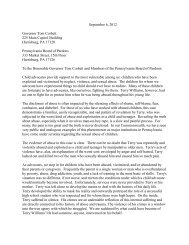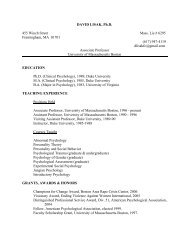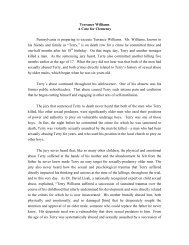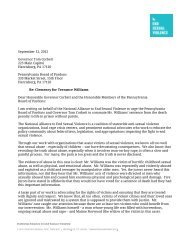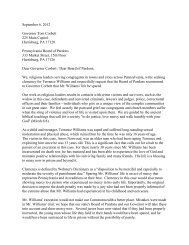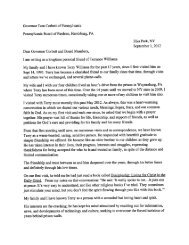Response in Opposition to the Commonwealth's Motion to Vacate
Response in Opposition to the Commonwealth's Motion to Vacate
Response in Opposition to the Commonwealth's Motion to Vacate
You also want an ePaper? Increase the reach of your titles
YUMPU automatically turns print PDFs into web optimized ePapers that Google loves.
<strong>the</strong> defense, <strong>the</strong> Commonwealth suppressed it and has argued (for years) that Mr. Williams' claimsof sexual abuse are self-serv<strong>in</strong>g and slanderous, just like <strong>the</strong> government argued aga<strong>in</strong>st <strong>the</strong>defendant's claims of drug use <strong>in</strong> Cone. The <strong>Commonwealth's</strong> current assertion, that Mr. Williamsshould have uncovered what <strong>the</strong> Commonwealth hid, asks this Court <strong>to</strong> sanction a procedure bywhich <strong>the</strong> "prosecu<strong>to</strong>r may hide, [and] defendant must seek"; such a procedure "is not tenable <strong>in</strong> asystem constitutionally bound <strong>to</strong> accord defendants due process." Banks v. Dretke, 540 U.S. 668,696 (2004).3. DiligenceThe Commonwealth has not made any express argument with respect <strong>to</strong> due diligence. JudgeSarm<strong>in</strong>a found that Mr. Williams exercised due diligence:Petitioner established that <strong>the</strong> claim could not have been raised earlier with<strong>the</strong> exercise of due diligence through <strong>the</strong> affidavit and testimony of Marc Draper.It is because of<strong>the</strong> statements <strong>in</strong> Mr. Draper's affidavit, <strong>in</strong> which he allegedthat he made a statement about petitioner's motive for <strong>the</strong> crime, which was neverdisclosed <strong>to</strong> <strong>the</strong> defense, that this Court ordered <strong>the</strong> DA's and police boxes opened.The <strong>in</strong>formation uncovered as a result of this Court's order could not havecome <strong>to</strong> light ifit weren't for Draper's orig<strong>in</strong>al affidavit.NT 9/28/12, 17. Judge Sarm<strong>in</strong>a fur<strong>the</strong>r found that <strong>the</strong> defense diligently obta<strong>in</strong>ed Mr. Draper'sstatements, which were not previously available <strong>to</strong> <strong>the</strong> defense. Id. at 18-19.Moreover, <strong>the</strong> prosecution's cont<strong>in</strong>u<strong>in</strong>g efforts <strong>to</strong> conceal <strong>the</strong> truth from Mr. Williams fur<strong>the</strong>rcounsel <strong>in</strong> favor of a f<strong>in</strong>d<strong>in</strong>g of diligence. The prosecution's conduct here is similar <strong>to</strong> that of <strong>the</strong>prosecution <strong>in</strong> Banks v. Dretke, 540 U.S. 668 (2004). There, <strong>the</strong> Supreme Court found that <strong>the</strong>petitioner had acted reasonably, despite hav<strong>in</strong>g failed <strong>to</strong> uncover <strong>the</strong> Brady violations sooner. Here,substitut<strong>in</strong>g Mr. Draper's name for <strong>the</strong> name of <strong>the</strong> witness <strong>in</strong> Banks fits <strong>the</strong> Supreme Court'sanalysis like a glove:19


